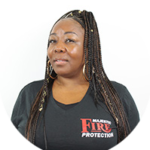Which Fire Extinguisher Is Best For Electrical Fire?
Which Fire Extinguisher Is Best For Electrical Fire?
Fire extinguishers have many types to be used for various fires, and each one uses a different material against different types of fires. To deal with electrical fires, class C fire extinguishers are designed to extinguish different fire types. If the fire erupts out of electricity, termed as an energized electrical fire, class C fire extinguishers can extinguish such fires. First, to completely put out electrical fires, you need to cut down the source of electricity as it could add fuel to the fire. A constant source of electricity can ignite the fire and results in a major catastrophe if the electrical supply is not disconnected in the event of a fire. It can burn everything available in the facility and result in the blast in situations containing flammable gases or liquids.
multiple sources of power failures can happen in a facility that results in electrical fires, and the most common of these include:-
fires arising due to short circuits
faulty wiring
overloaded devices
wire damages
broken electrical outlets
poor installation of lights
Fire Extinguisher Classes Associating To Electrical Fires
Electrical fires can be blown out using extinguishers containing non-conductive materials rather than foam-based equipment because water-based extinguishers can cause a severe fire hazard due to their high conductivity. If anyone uses water or foam-based extinguishers to stop electrical fires, it will result in disaster and severe damage. It led to creating new types of fire equipment, i.e., class C fire equipment that is safe to use on electrical fires and made up of ingredients like potassium chloride, mono-ammonium phosphate useful potassium bicarbonate substance to stop the fire. Some class C-type fire extinguishers use carbon dioxide to control fires because CO2 can prevent fires due to its capability to keep the oxygen out of the fire and stop the heat as it gets cold when applied to the fire.
Since the c type fire extinguisher contains non-conductive materials, they are quite helpful in extinguishing fires that are blown due to electrical faults. However, it is recommended to have both types of fire extinguishers in hand to use at the time of emergency to put out different types of fires spread out of something. You should have class A or class C fire extinguishers to deal with the different types of fires. You need to know how and where to use the fire extinguishers.
It is recommended to keep a check on all the electrical works and carry regular inspections to ensure electric circuits are working correctly. You can take help from trained professionals who are specialized in the field. This is the only way you can prevent such catastrophic accidents at your workplace or building. Besides, you need to make sure your fire safety equipment is in working condition and ready to use when required. Gather all the information relating to the electrical work in the premises and do annual inspections on all IFC codes implemented in your building design.



